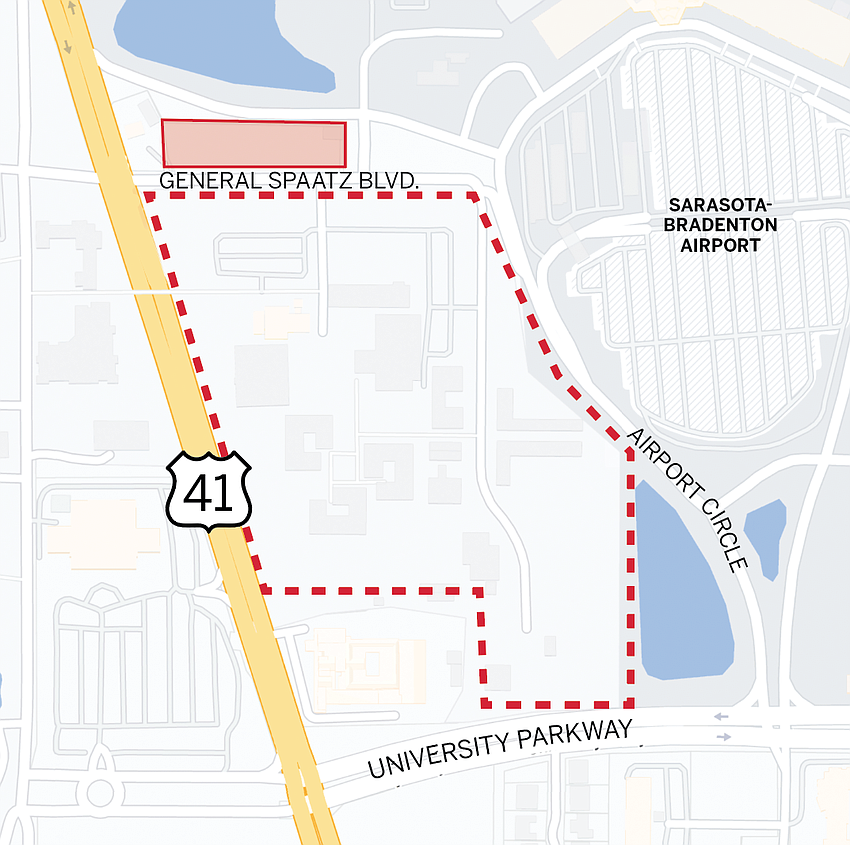- May 8, 2025
-
-
Loading

Loading
While traveling out of the country last week, Sarasota-Bradenton International Airport President and CEO Rick Piccolo was informed that the Federal Aviation Administration declined to permit the airport to sell 31 acres of surplus land to current lessee New College of Florida.
Back at his desk Monday morning, he had the five-page document that lays out reasons for the agency’s decision, which did not change Piccolo’s initial reaction, saying only, “The FAA has notified the airport that the FAA has declined to approve the request to release the land for sale to New College. The airport does not agree with this initial determination and will pursue further discussions on this matter.”
Piccolo said he would have no further comment on the matter until he further digests the report.
Contacted on Monday, New College officials have not responded to a request for a comment regarding the FAA document.
The document, though, goes further than simply denying the $11.5 million sale to the college of land it currently leases, a 99-year agreement that expires in 2025. It suggests that the FAA not only never authorized the lease, it was also unaware the lease even existed.

At the time the original lease was written in 1957, neither the FAA, New College nor the airport in its current form and authority even existed. The FAA was created in 1958, New College was founded in 1960 and, in 1970, the Sarasota-Manatee Airport Authority was created via a referendum of Sarasota and Manatee county voters.
"No documentation was found to indicate the FAA or its predecessors or federal agencies approved the non-aeronautical land use,” reads the letter to Piccolo, signed by FAA Acting Manager Rebecca Henry. “Based on information reviewed by the agency, it appears the land leased to New College was converted from aeronautical use to non-aeronautical educational/residential use without FAA consent.”
As for the current and planned future uses of the site by New College, “The college contains elements that likely are incompatible with airport operations such as residential, educational, recreational and water retention areas that could attract wildlife, which may pose a risk to aviation safety,” reads the letter.
“Residential development, either standing alone or co-located as part of a hangar or other aeronautical facility, is not an acceptable use of airport property under the federal grant assurances or surplus and non-surplus property federal obligations.”
The agency also rejected a concern expressed by the Airport Authority included in its request to sell the land that reclaiming it at the end of the lease period, at which time none of the principals of the college or the Authority will be involved, may involve legal entanglements.
“If evicted at the end of the agreement (and potentially before) the Authority fears the college will initiate costly litigation and/or eminent domain processes that could cause significant political problems,” reads the letter. “However, it is unclear why the airport could not lawfully reclaim airport property at the end of a lease.”
According to the FAA, the entire airport property was transferred from the federal government to local civilian use authority in December 1947 under the Surplus Property Act of 1944. The land had been used for military operations.
The lease was initiated in 1957, but was proposed for retail development, an accepted land use for property designated for aviation purposes. The retail development never occurred and the lease was later assigned to New College after it took over the property. Then via amendment, it was expanded to the current acreage in June 1962.
Since that time, New College developed its West Campus, or the Pei Campus in acknowledgment of dormitories designed by famed architect I.M. Pei. The college has plans for new residences and athletic facilities on the site that now appear in doubt barring a change of bureaucratic heart, particularly in light of the FAA’s opposition to residential use of the property.

“The area has been zoned as property for medical, charitable and institutional development, which could include office space and meeting space, but residential and recreational use is not necessarily specified,” the letter reads. "It should be noted that FAA guidance requires all airport properties to be zoned airport/light industrial, consistent with federal grant assurances.”
Its sole mission is to protect and enhance the nation’s civil aviation system the FAA’s Henry wrote the proposed sale yields no benefit toward that end, other than providing revenue to help fund capital expansion and improvements of the airport.
The FAA isn’t the only federal agency involved, either. The Department of Defense also has a say in the final disposition of the property, or the lack thereof.
“The FAA will not release airport property from its federal obligations so that it can be used for residential development,” reads the letter. “Further, if the land is surplus property, then DOD must concur that it is not needed for aeronautical or emergency use for the foreseeable future. Obligated airport land may not be released unless the FAA finds that it is no longer needed for airport purposes, but the release must be restricted to ensure right of flight and prevent incompatible development like residential.”
Finally, the 99-year lease far exceeds the 25-year limit suggested by the FAA, which also holds that airport land leases of any kind shall not exceed 50 years without advance agency approval as such a lengthy term is tantamount to disposal of airport property, limiting opportunities for needed aeronautical development. Whether such a time limit existed prior to the creation of the FAA is unknown.
The letter concludes, “Other than the proposal to divest itself of the airport property in question, it is unclear whether the airport sponsor will seek to address the concern that the existing New College lease may create unlawful airport revenue diversion and an incompatible land use.”